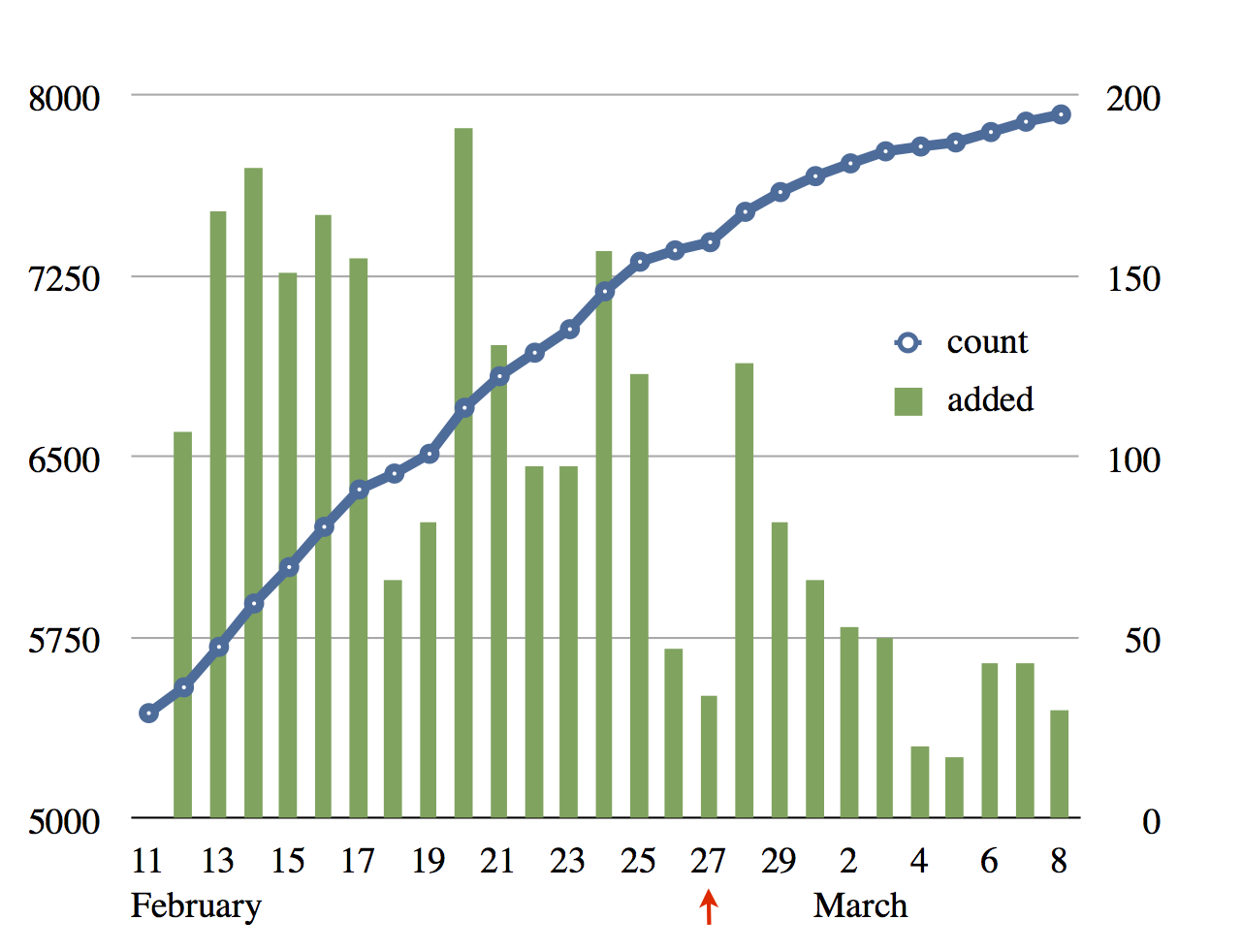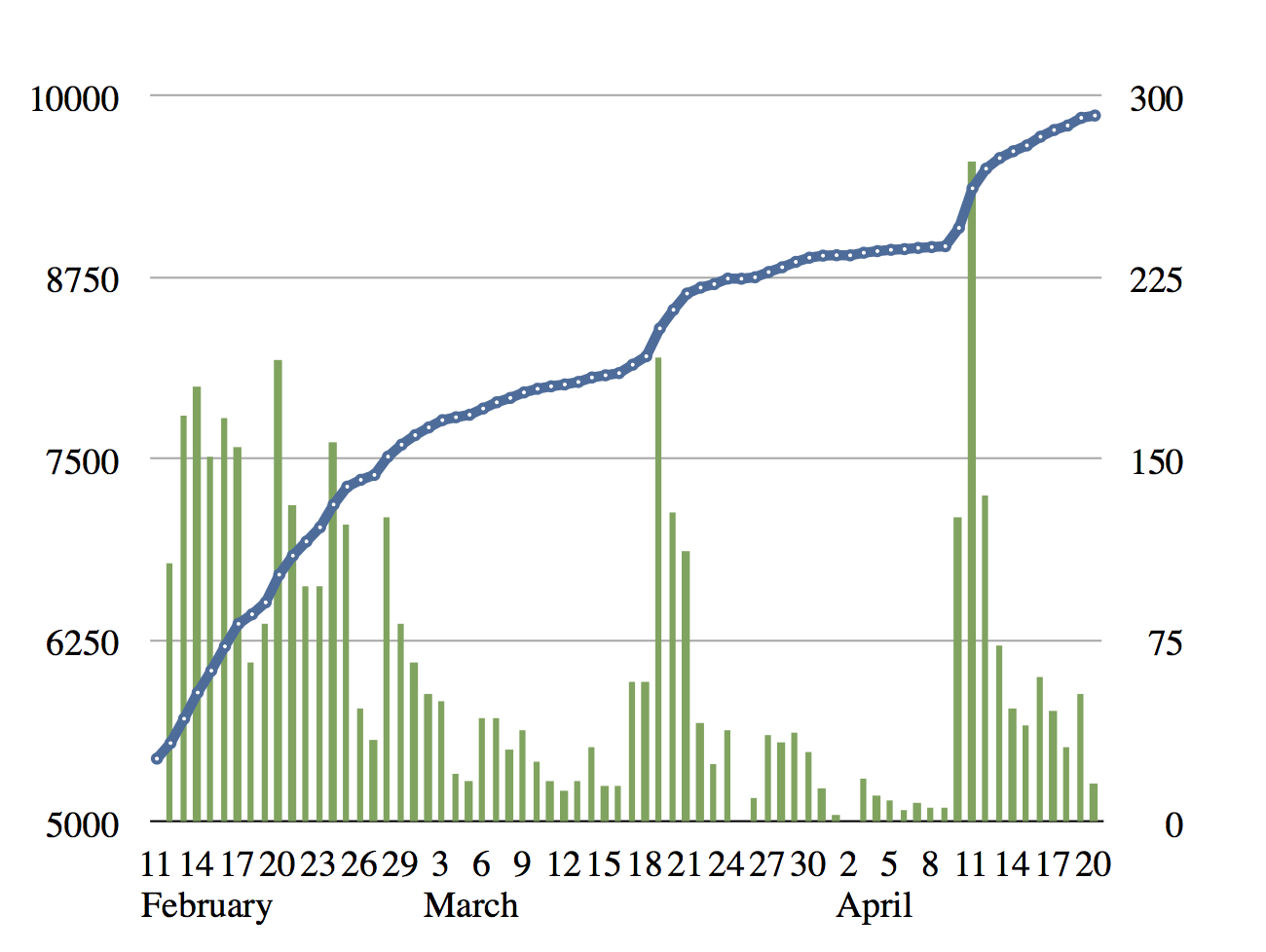The “Cost of Knowledge” boycott trajectory
March 8th, 2012
 |
| “Have scientists lost interest again?” |
The “Cost of Knowledge” boycott of Elsevier is in its seventh week. The boycott was precipitated by various practices of the journal publisher, most recently its support for the Research Works Act, a bill that would roll back the NIH public access policy and prevent similar policies by other federal funding agencies.
Early on, several hundred researchers a day were signing on to the pledge not to submit to or edit or review for Elsevier journals, but recently that rate had settled down to about a hundred per day. On February 11, I started tracking the daily totals by scraping the site through a simple scraper I set up at ScraperWiki. I’ve graphed the results in the attached graph, showing raw count of signatories with the blue line (left axis) and the number added since the previous day with the green bars (right axis).
As you can see from the chart, there seems to be a slight drop in activity around weekends, and Sunday February 26 and Monday February 27 had clearly been the slowest days since I’ve been keeping records, and likely since the effort started. On the 27th (red arrow), Elsevier issued its quasi-recantation of support for RWA. (“While we continue to oppose government mandates in this area, Elsevier is withdrawing support for the Research Work Act itself. We hope this will address some of the concerns expressed….”)
The day after Elsevier’s announcement saw a bit of a bump back to previous levels. Was this an instance of the Streisand effect or was the 26-27 dip an aberration? It’s hard to tell. However, since the 27th, it seems clear that the number of pledges is down considerably. It could well be that Elsevier’s tactical approach has worked and it has stanched the spate of boycott pledges, despite the fact that the community was generally unimpressed with Elsevier’s statement, as Peter Suber has cataloged. Alternatively, the current rate of new pledges may just reflect the natural reductions that had been happening over the last few weeks.
Elsevier has not changed its underlying stance. It still “continue[s] to oppose government mandates” for public access, as per RWA. It strongly opposes FRPAA. Have scientists lost interest again?
 |
| “Note the surges…” |
[Update 4/20/2012: Now that a few more weeks have passed, here’s an updated figure of the boycott growth. Note the surges around March 18 and April 10. As near as I can make out, these were the result of widely disseminated coverage in Slashdot and the Guardian, respectively. These surges show that the boycott hasn’t played itself out yet, and that continued discussion of the boycott is likely to lead to a continued steady rise in the number of signatures.
At the current rate, I expect the number of signatories to hit 10,000 around April 27 or so.]
[Update 4/24/2012: Well, my guess was wrong. A big bump of activity in the last few days meant that the boycott broke 10,000 signatures on April 23. I’m not sure who to blame for the renewed interest in the last couple of days. Anyone have any conjectures?]
April 14th, 2012 at 11:55 am
[…] covered by Nature, the Chronicle of Higher Education, and most recently, The Guardian. But, as Harvard professor Stuart Shieber pointed out on his blog about the daily signups asking “Have scientists lost interest again?”, the signatures […]
April 14th, 2012 at 4:05 pm
[…] covered by Nature, the Chronicle of Higher Education, and most recently, The Guardian. But, as Harvard professor Stuart Shieber pointed out on his blog about the daily signups asking “Have scientists lost interest again?”, the signatures started […]
May 2nd, 2012 at 6:20 am
[…] signed a petition to boycott Elsevier, one of the major global players in scientific publishing, already has more than 10,000 signatories. The time has clearly come for a change , and because the internet cannot be controlled by […]